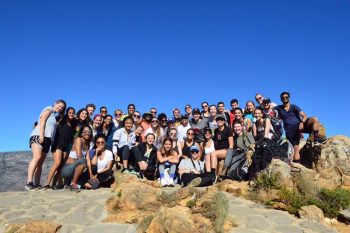by Ally Agoglia
The social entrepreneurship dialogue to South Africa opened my eyes to a country I had never experienced, people who understood firsthand the challenges poverty presented, and mechanisms for change that originated largely at the grassroots level. During our trip, we learned about social entrepreneurship alongside our classmates from TSiBA, a business school that provides free or highly subsidized education to predominantly black and colored students in Cape Town. In our smaller Northeastern and TSiBA teams we were paired with local micro-entrepreneurs, later visiting their stores or offices, and offering our business consulting skills to provide the company with tools for improving their efficiency. From this experience, we discovered some of the multi-faceted struggles that under-resourced entrepreneurs face in a developing country on top of the evident challenges that entrepreneurs face globally.

Outside of our classroom time, we engaged in work with multiple organizations that sought to address key issues including as sexual harassment of children, health care, and malnutrition. With free meals provided by the organization Food for Life, hundreds of community members congregated towards a VisionSpring eye care clinic temporarily constructed in a local school. Our dialogue team tested those with sight troubles, and fitted the individuals with appropriate glasses if necessary for a low cost. Upon finding the right prescription glasses for an elderly woman from the community, I watched as she slid them on her face. When she looked down to the paper to determine whether her eyesight had improved, tears immediately streamed down her face. She bundled me up in a comforting hug, explaining that she hadn’t been able to see for years until today. This clinic and its eyeglasses changed the lives of hundreds of individuals in minute ways such as enabling a grandmother to read the newspaper again, or much more evident ways of equipping a woman to re-start her sewing business.
While in Cape Town, we experienced an intense but short-lived storm. With waves surging over the beach barriers, we remained sheltered inside of the apartment complex, safe from the cold, rain, and wind. Just weeks before, we had walked through the townships and informal settlements of Enkanini, Imizamo Yethu, Langa, and Khayelitsha, marveling both at the creativity sparked from such dire poverty, and reflecting on the still seemingly-hopeless situations of many of the residents. We learned about the power of collective action with community gardens, and the innovative fire-detection technology, Lumkani, that helped address the tragic issue of shack fires within the townships. Despite these advancements, most homes were smashed together, walls often constructed of corrugated tin, scrap metal, or even plastic bags. While we stayed comfortably inside during the storm, hundreds of thousands of people in the townships were left vulnerable to the extreme winds that flattened shacks and led to numerous injuries. These sharp contrasts defined my time in Cape Town. Privilege, in the form of income, housing locations, and opportunities remains a key indicator of inequality, reflecting the legacy of apartheid. These challenges continue to necessitate effective innovations to begin to change the narrative of generational poverty.
As Brian Stevenson advised during his First Pages talk at Northeastern several weeks ago, to truly start to address social problems, we must get proximate to the issues. This dialogue provided me with the opportunity to begin to understand some of the chronic problems affecting the township residents that perpetuate the cycle of poverty. Throughout our work with local micro-entrepreneurs, we witnessed the power small businesses can have as catalysts for this change. I seek to take this perspective back to my classes here at Northeastern to more critically analyze what interventions might be most helpful in this field.


